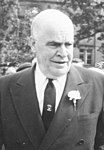
The 1876 United States presidential election was the 23rd quadrennial presidential election, held on Tuesday, November 7, 1876.

Luther Hartwell Hodges was a businessman and American politician. After a career in textile manufacturing, he entered public service, gaining some state appointments. Elected as lieutenant governor of North Carolina in 1952, he succeeded to the Governor's office in 1954 after the death of the incumbent. He was elected in 1956 to a full four-year term, serving in total as the 64th governor of the state of North Carolina from 1954 to 1961.

James Hovis Hodges is an American businessman, attorney, and politician who served as the 114th governor of South Carolina from 1999 to 2003. A former member of the South Carolina House of Representatives, Hodges is the most recent Democrat to serve as the state's governor.

The lieutenant governor of North Carolina is the second-highest elected official in the U.S. state of North Carolina and is the only elected official to have powers in both the legislative and executive branches of state government. A member of the North Carolina Council of State, the lieutenant governor serves a four-year term with a two consecutive term limit. The current lieutenant governor is Mark Robinson, a Republican, who has held the office since 2021. The Constitution of North Carolina designates the lieutenant governor the ex officio president of the State Senate and a member of the State Board of Education. They are also required to serve as acting governor of the state in the event of the governor's absence, and assume the governorship in the event it becomes vacant.

The 1978 United States Senate elections were held on November 7, in the middle of Democratic President Jimmy Carter's term. The 33 seats of Class 2 were contested in regular elections. Special elections were also held to fill vacancies.

The 2000 United States elections were held on November 7, 2000. Republican Governor George W. Bush of Texas defeated Democratic Vice President Al Gore of Tennessee in the presidential election. Republicans retained control of both houses of Congress, giving the party unified control of Congress and the presidency for the first time since the 1954 elections.

The 1896–97 United States Senate elections were held on various dates in various states. As these U.S. Senate elections were prior to the ratification of the Seventeenth Amendment in 1913, senators were chosen by state legislatures. Senators were elected over a wide range of time throughout 1896 and 1897, and a seat may have been filled months late or remained vacant due to legislative deadlock. In these elections, terms were up for the senators in Class 3.

The 1982 Tennessee gubernatorial election was held on November 2, 1982, to elect the governor of Tennessee. Incumbent Republican governor Lamar Alexander was now qualified to run for re-election because of Tennessee's 1978 constitutional amendment allowing governors to serve a second consecutive four-year term. Alexander ran for re-election and defeated Democratic nominee Randy Tyree with 59.6% of the vote in the general election.

The 1976 North Carolina gubernatorial election was held on November 2, 1976. Democratic nominee Jim Hunt defeated Republican nominee David T. Flaherty with 64.99% of the vote.

The 1978 Tennessee gubernatorial election was held on November 7, 1978, to elect the next governor of Tennessee. Although the Tennessee State Constitution had been amended in early 1978 to allow a governor to succeed himself, Incumbent Democratic governor Ray Blanton chose not to seek re-election. Republican Lamar Alexander once again ran for governor. In the general election, Alexander defeated Democratic nominee Jake Butcher with 55.8% of the vote.

The 1972 North Carolina gubernatorial election was held on November 7, 1972. Republican nominee James Holshouser defeated Democratic nominee Skipper Bowles with 51% of the vote. Holshouser thus became the first Republican elected governor of the state since 1896.

The 1970 Tennessee gubernatorial election was held on November 3, 1970, to elect the next governor of Tennessee. Incumbent Democratic Governor Buford Ellington was term-limited and was prohibited by the Constitution of Tennessee from seeking another term. Republican nominee Winfield Dunn, defeated Democratic opponent John Jay Hooker with 52.0% of the vote.

The 1968 North Carolina gubernatorial election was held on November 5, 1968. Democratic nominee Robert W. Scott defeated Republican nominee Jim Gardner with 52.70% of the vote.

The 1966 Idaho gubernatorial election was held on November 8. Republican nominee Don Samuelson defeated Democratic nominee Cecil Andrus with 41.4% of the vote in a four-way race.

The 1958 Idaho gubernatorial election was held on November 4. Incumbent Republican Robert E. Smylie defeated Democratic nominee Alfred M. Derr with 50.96% of the vote.

The 1960 North Carolina gubernatorial election was held on November 8, 1960. Democratic nominee Terry Sanford defeated Republican nominee Robert L. Gavin with 54.45% of the vote.

The 1954 Tennessee gubernatorial election was held on November 2, 1954, to elect the next governor of Tennessee. Incumbent Democratic Governor Frank G. Clement defeated Independent candidate John Randolph Neal Jr. with 87.2% of the vote.

The North Carolina Council of State elections of 2020 were held on November 3, 2020, to select the ten officers of the North Carolina Council of State. These elections coincided with the presidential election, elections to the House of Representatives, elections to the Senate and elections to the North Carolina General Assembly and top state courts. Primary elections were held on March 3, 2020, for offices for which more than one candidate filed per party.

Elections were held in Illinois on Tuesday, November 6, 1956.

The 2018 United States attorney general elections were held on November 6, 2018, in 30 states, 2 territories, and the District of Columbia. The previous attorney general elections for this group of states took place in 2014, except in Vermont where attorneys general serve only two-year terms and elected their current attorney general in 2016.
















